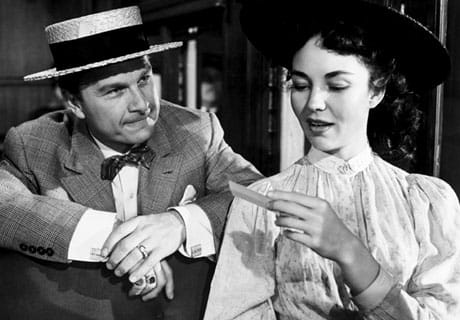Theodore Dreiser's 1900 novel Sister Carrie is a grim masterpiece of social yearning and economic desperation; it only makes sense that Hollywood would reduce it to a broad and expository soap opera. Jennifer Jones is the titular Carrie, who arrives in Chicago, becomes the kept woman of one Mr. Drouet (Eddie Albert) and wins the heart of the married and well-to-do George Hurstwood (Laurence Olivier), who throws away his position and family in order to run away with her. Unfortunately the story has no point when divorced from Dreiser 's precise delineation of the characters' interior monologues without knowing their ill-understood motives and the unseen forces that drive them, it's just another story of an innocent ingénue and her amour fou. Director William Wyler doesn't help matters by shooting in his usual long-take, deep-focus style, refusing to acknowledge anything beyond what exists on the surface: instead of evoking an inner state he lets the blunt dialogue do everything and foolishly allows us to admire the period elements that the novel dismissed as vulgar and shallow. True, Olivier is a standout as the doomed and thwarted Hurstwood, and Albert gives a bizarre teddy-bear of a performance as the fun-loving Drouet, but the title role goes to a Jones, who looks stunned and confused, as if she didn't understand the role and was simply humouring the director until she could figure out a means of escape. Worst of all is that the fear of grinding poverty that drove the novel's characters has been so softened that it's barely noticeable as a plot device. Trainspotters take note: the DVD is an extended version featuring a flophouse scene (the strongest in the film) deleted from the original release print. (Paramount)
Carrie
William Wyler

BY Travis Mackenzie HooverPublished Feb 1, 2005